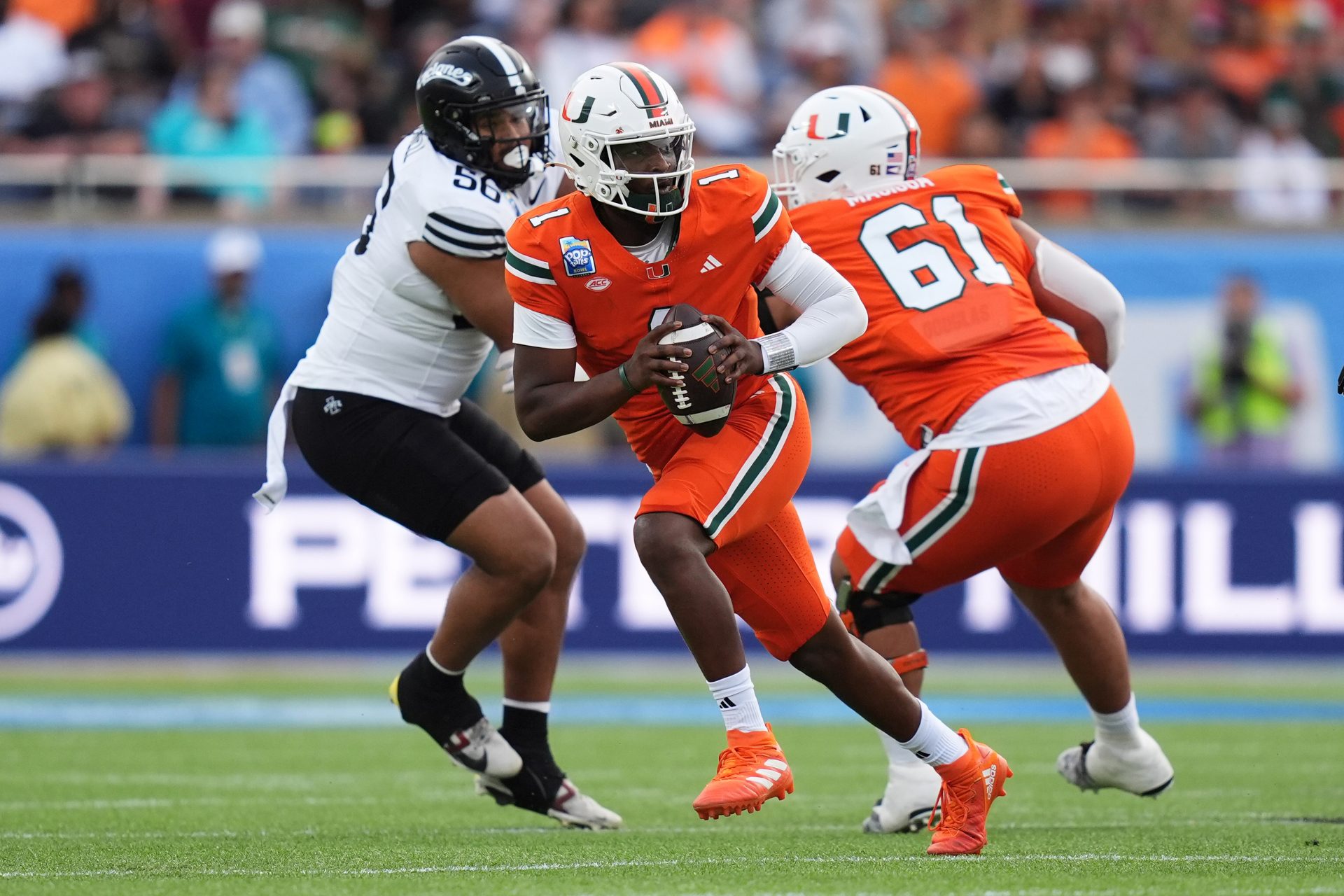The Miami Hurricanes fell short to the Iowa State Cyclones 42-41 in a Pop-Tarts Bowl that lived up on-field to the hype it generated off the field. Cam Ward broke the Division I career passing touchdowns record in the first half but was nowhere to be seen after the intermission period.
In an era where bowl opt-outs are as controversial as ever, this generated conversations and plenty of pushback, with some questioning whether he was watching out for himself or leaving his team in the dust.

Was Cam Ward’s Halftime Departure a No-Brainer or a Disservice?
It would be remiss to say that Ward has not given his all to the sport of football, at least from the public eye. Starting his career at the University of Incarnate Word, an FCS program that competes in the Southland Conference, Ward was a zero-star recruit with no offers coming out of high school, according to 247Sports.
He earned his way to the FBS level with a 71-touchdown underclassman run, transferred to the Washington State Cougars, and then played his way onto the big stage, parlaying it into a move to the Sunshine State and Miami.
After five seasons, Ward had played himself into not just NFL Draft conversations but into legitimate first-round and top-five buzz. In College Football Network’s latest three-round mock draft, James Fragoza had the West Columbia, Texas, native landing with the Tennessee Titans as the second QB off the board.
With heavy draft stock on the line, no one would blame Ward for opting out of the bowl game altogether. Certainly, not all fans could be pleased, but it’s an understandable, self-preserving move for an athlete who played his way into the position he was in.
However, Ward chose to play and started the first half. Just shy of Case Keenum’s career Division I passing touchdown records from his time with the Houston Cougars, the Heisman Trophy finalist connected with Jacolby George for a four-yard, first-quarter score. He tossed two more in the second quarter for safety, capping off a hat trick that highlighted a narrow 31-28 Miami lead.
But coming out of the break, Ward was not back under center, setting up sophomore Emory Williams to carry the team to victory. This was met with backlash as fans and media alike reacted to his early departure.
This decision by Cam Ward to opt out of the 2nd half of a game deserves to be infamous.
It's a testamant to doing things halfway. Never looks right. #PopTartsBowl
— RedditCFB (@RedditCFB) December 29, 2024
“Cam Ward quitting on his team halfway through a game because he already broke some personal record is everything that is wrong with college football,” said one fan, making his thoughts felt on the situation.
Doing what Cam Ward just did is 10000% times worse than opting out
— Brent (@HJhughes79) December 29, 2024
However, not everyone was opposed to the decision, with some claiming that playing at all was more than the star QB needed to do.
“Same people criticizing Cam Ward for sitting out the 2nd half of the Pop Tarts Bowl, would be saying how dumb it was for him to play if he got hurt,” said Robert Griffin III, a former Heisman winner with the Baylor Bears. “He didn’t have to play AT ALL. Instead he gave us a half of jaw dropping plays. Stop villainizing these student athletes.”
“Cam Ward is loved by his teammates, didn’t have to play in the bowl game at all, came in to break a record he’s worked for, then sat the 2nd half so his backup could have the opportunity to be evaluated. Who cares,” shared another.
The decision was not made hastily, as assured by Miami head coach Mario Cristobal postgame: “I think all meetings with players and decisions like that, we make them in private and we keep them in private. So, I’ll prefer not to answer questions as it relates to that. I know he played his best while he was in there.”
With Ward initially choosing to play, it felt like it was part of a movement of players choosing to take one last stand with their teams before they depart for the NFL Draft. Most notably, Travis Hunter and Shedeur Sanders of the Colorado Buffaloes opted to compete in the Alamo Bowl against their Big 12 foes, the BYU Cougars.
However, they were offered a rather uncommon opportunity, benefitting from an injury insurance policy that is not standard among college football stars in postseason play.
At the same time, it’s fair to question why Ward, seeing his team down one point with 56 seconds to go, willingly sat on the sideline while his team put in a last-ditch effort to snatch victory out of the jaws of defeat, a practice that Miami’s QB made common-place throughout his historic, at times fabled, run in 2024.
Ward led a game-winning drive with two minutes to go against the Virginia Tech Hokies (scored with 1:57 remaining) and California Golden Bears (0:26 remaining) and was second in the nation in EPA per dropback with 0.36, showcasing the fear he put into opponents.
However, perhaps the biggest disservice was not the impact that the decision had on his team or the lack of compassion some fans gave Ward as he chose to protect himself after giving his all in a historic five-year career that spanned the country. Maybe it was never letting him have the opportunity to share why he made the decision in the first place.
What a mess. College coaches do their players such a disservice by hiding them. I think Cam Ward would be OK, somehow, by addressing this. https://t.co/kpf1Tad6d1
— Ian Rapoport (@RapSheet) December 29, 2024
College Football Network has you covered with the latest from the ACC, Big Ten, Big 12, SEC, and every Group of Five conference and FBS Independent program.

